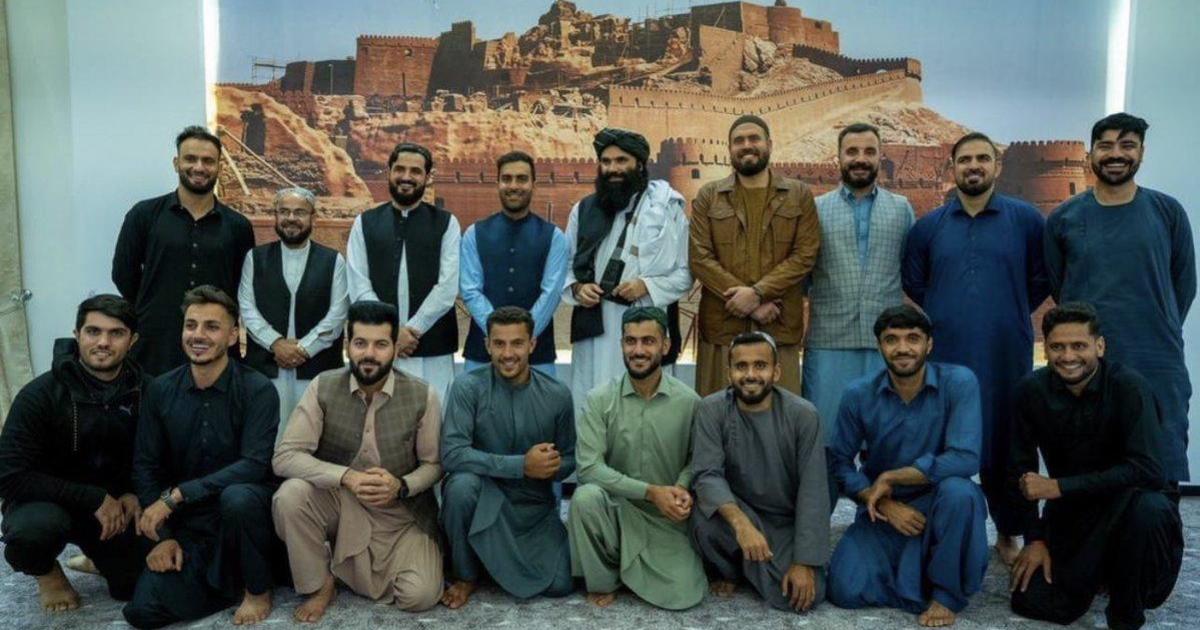[ad_1]
For decades, Afghanistan has been portrayed to the world largely through bleak accounts of daily bombings, mass causalities, political turmoil and humanitarian crises. Perhaps its only real success story, has been cricket. The world’s second-most popular sport has long been a national pastime in Afghanistan, and it has given the Afghan people, through decades of strife, a way to see their nation shine on the world stage.
Now, as the result of their draconian human rights policies, the country’s Taliban rulers appear poised to deprive the Afghan people of even that last bastion of joy.
WAKIL KOHSAR/AFP/Getty
Afghanistan’s national cricket team was formed following the U.S.-led invasion in 2001, and the team rapidly rose to become serious contenders in international men’s championships. But since the Taliban took the country back in the summer of 2021, the team has faced some serious setbacks.
In solidarity with Afghan women and girls, who have seen virtually all of their basic human rights erased under the Taliban, Australia’s national cricket association announced last week that it would not play against Afghanistan in a pre-scheduled series of one-day matches in March.
Cricket Australia said it had taken the decision due to the “recent announcement from the Taliban restricting the freedoms of women and girls in Afghanistan,” adding that it was “committed to supporting growing (sic) the game for women and men around the world, including in Afghanistan.”
On Monday, Human Rights Watch called on the International Cricket Council to suspend the Afghanistan Cricket Board from its membership over the Taliban’s regressive and anti-women policies.
Minky Worden, director of global initiatives for HRW, said the ICC “should suspend Taliban-run Afghanistan from ICC membership, and from participating in international cricket, until women and girls can once again participate in education and sport in the country.”
In December, the Taliban banned women from working for a wide range of organizations and from attending universities, sparking worldwide condemnation.
It’s not politics, “it’s their life.”
Afghan cricket fans and players on the national team have launched a campaign on social media using the hashtag, #StopPoliticsinCricket.
Rashid Khan, Afghanistan’s first global cricket superstar, denounced Cricket Australia’s withdrawal from the match and threatened to pull out of Australia’s Big Bash League.
“If playing with Afghanistan is so uncomfortable for Australia then I wouldn’t want to make anyone uncomfortable with my presence in the BBL,” said Rashid on Twitter.
“Fans and people of Afghanistan who have suffered immensely due to conflict for the past 42 years don’t want politics brought into sports,” added Hashmat Shahidi, another member of the national team, on Twitter.
But for countless Afghan women and girls, it’s not politics, it’s a fight to be recognized as human beings equal to their male relatives, colleagues and fellow students.
Samea Shanori, who lives in the U.S., replied to Shahidi and the “StopPoliticsinCricket” campaign with a tweet saying “basic human rights of girls and women in Afghanistan are not politics. It’s their life.”
The national cricket team’s players and board members have met on multiple occasions with Taliban leaders, including the head of the notorious Haqqani network, and posed for photos with them.
Sirajuddin Haqqani is the current acting Minister of the Interior under the Taliban regime. The FBI has offered $10 million to anyone who can provide information that leads to his arrest.
The U.S. says his Haqqani network was responsible for the deaths of hundreds of Afghans and dozens of American forces, many of them in suicide attacks, across Afghanistan during the two-decade war.
Holding meetings with such figures has eroded support for even Afghanistan’s most beloved cricketers.
“When the very existence of women of Afghanistan is banned, you should be banned too. Why does your cricket matter when women can’t learn, move, work, under the Taliban?” asked Zubaida Akbar, an Afghan human rights advocate. “Instead of taking photos with Haqqanis you could have used your voice to speak for the rights of half of the population.”
[ad_2]






